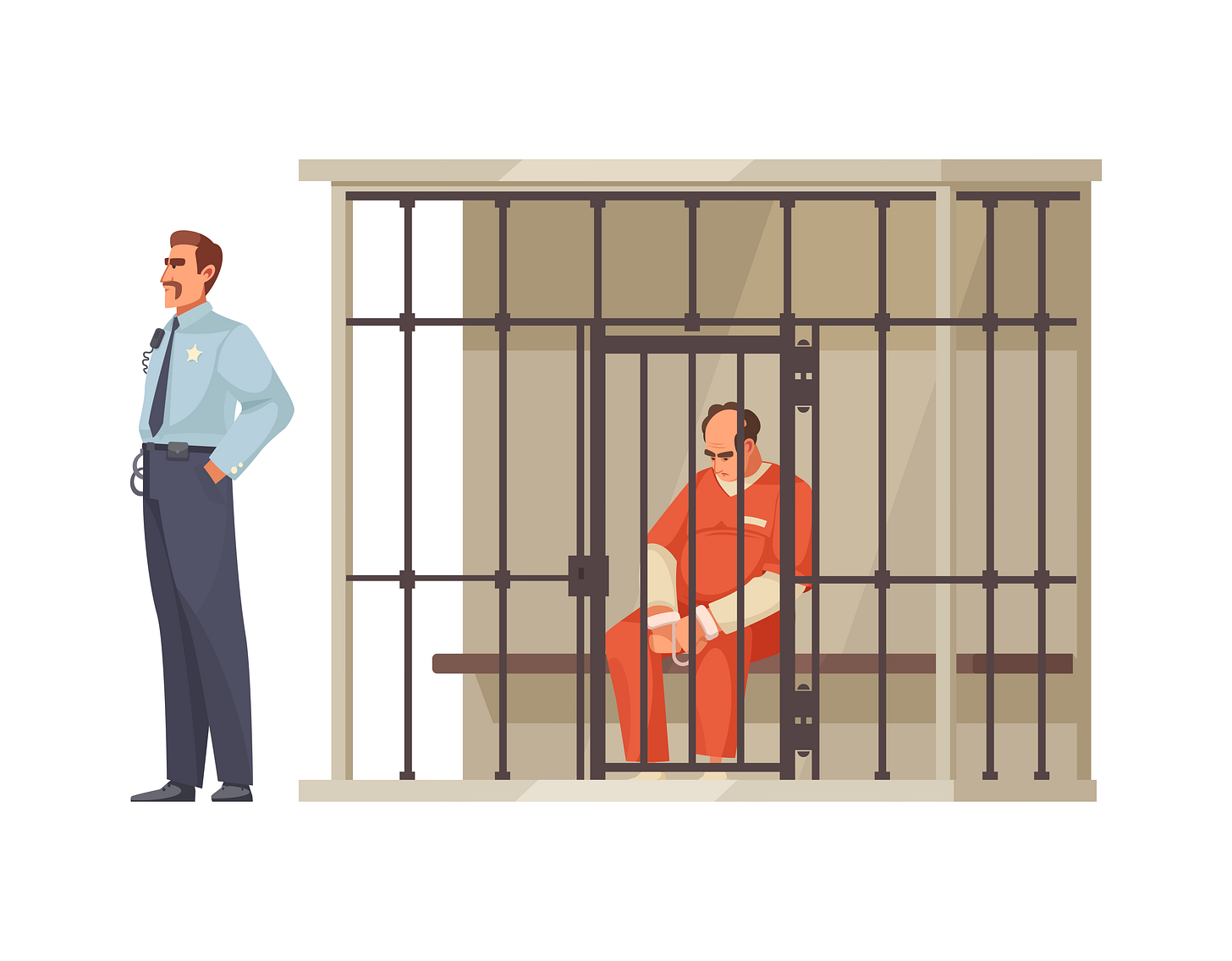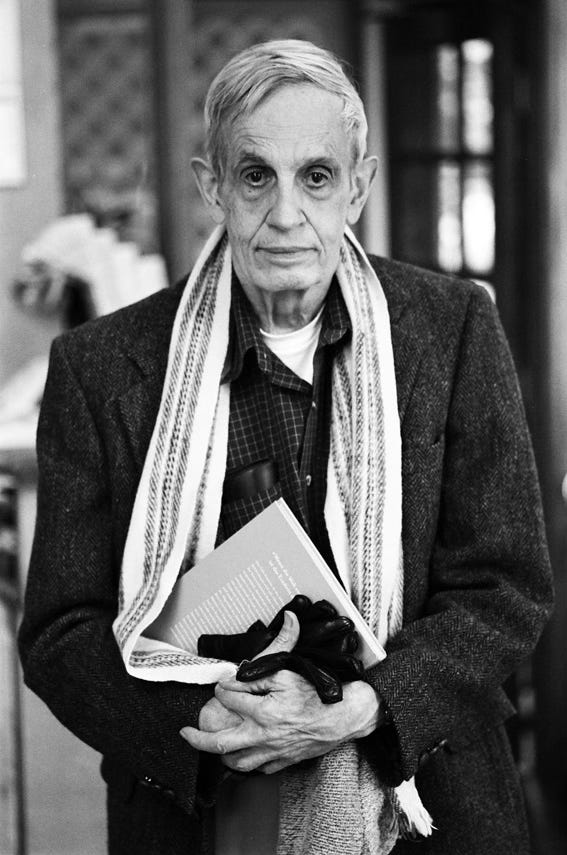How You Can Make Better Choices (Spoiler: Self-Interest Fails)
Nash Equilibrium, Pareto Efficiency and mathematical induction
Some weeks ago we discovered our intuition is not as good as we might think, specially with probabilistic things. Today we will see how the rational thinker inside us can help us solve deterministic problems.
The prisoners dilemma
Let’s start like two weeks ago and consider a mental experiment:
Two members of a criminal gang are arrested by the police. They are separated and can’t communicate to each other, and they have to go to court the next day.
The initial sentence is that both of them will be 1 year in prison. However, the police offer them individually the following deal: if one of them testifies against the other, they will not go to jail and, instead, the other will be sentenced to 3 years.
But, if both of them testify, the sentence of each will be 2 years instead of one.
What should they do to reduce their sentence as much as possible?
What would you do if you are put into this situation? Would you testify or not?
Analysis
The problem seems complicated at first.
Your sentence does not only depend on what you do, but also on what the other person does. And you don’t know what they will do!
But we can break it case by case:
If the other person testifies, you will:
Get a 3 year sentence if you do not testify.
Get a 2 year sentence if you also testify.
Thus, if the other person testifies, you should testify to reduce your sentence.
If the other person does not testify, you will:
Get a 1 year sentence if you do not testify
Get a 0 year sentence if you do testify.
Thus, if the other person does not testify, you should testify to reduce your sentence
Regardless of what the other person does, your best option is to testify.
Nash Equilibrium
The outcome above is known as a Nash equilibrium.1
To explain you what is a Nash equilibrium I will tell you what is not a Nash equilibrium.
Say you both played any other way. For example, you testified and they didn’t. Then they will be sentenced to 3 years. They are not playing their best: testifying reduces their sentence (from 3 to 2 years).
If you don’t testify and they do, you are not playing your best for the same reason—testifying will reduce your sentence.
And if neither of you testify, then you are actually not playing your best either! If they keep not testifying but you instead testify, you will go free!
Both testifying is the only way that none of you can improve their situation, given the action of the other. That is what a Nash equilibrium is.
What is the upshot?
When approaching decision-making situations like the one above, we want to have a strategy that is in a Nash equilibrium. Otherwise, we are not playing our best: there is a chance to improve our outcome by changing our strategy.
Revenge?
Now imagine you were presented with a situation like this many times.
For instance, you know that there will be five trials. You could try not testifying and see if the other person does the same. If they also don’t testify, you might start building some trust between each other and start some sort of cooperation. If, on the other hand, they testify against you, you will take note of this and take action accordingly: in the next trials, you will also testify against them.
What would be the best strategy? Should we trust that there will be some cooperation? Try to build it for a couple rounds?
What would you do in real life?
Mathematical induction
Remember that the rational way to approach this decision games is looking for a Nash equilibrium.
Let’s start from the end.
You are in the last trial. Do you testify or not?
There are no more trials later, so the other person won’t have a change to retaliate if we play selfish and testify. It is effectively as if there was only one trial, and we already solved this problem above: regardless of what the other person does, it is always best to testify. The best option for both of you is to testify .
Now go back one trial.
It doesn’t matter what we do now, in the next trial the other person will testify (we just argued this!). There is no point in trying to establish a cooperation: there will not be cooperation in the next round. So you conclude you should testify in this round too.
Now go back one more trial.
Again, no matter what we do now, in the next round the other person will testify. Just as above, both of you are better off testifying this round too.
Now keep going back, until the first trial. We argue as above and we conclude we need to testify.
The Nash equilibrium is achieved by testifying in every trial. That’s the best strategy.
PS You just learned one of the most common methods of proof in mathematics: mathematical induction. We first showed there is a first case where we must testify (the last round). We then inducted that, based on this, we should also testify in the next case (the previous round). Testifying the last round implies doing it also in the previous one; and then that implies testifying also in the previous one; and we keep going until the end.
A plot twist
Here is something really cool.
If you are presented with this situation many times, but you don’t know how many (for example, if you know you will go to court several times, but you don’t know how many), then you might want to cooperate!
Wait, didn’t we just say that we should always testify?
Once again we need to look at what information we have.
How did the reasoning above go? We started at the last round and argued that, since there was no time for the other person to retaliate later, the best option was to testify.
Here is the key: before we had the information that it was the last round. This was crucial, otherwise we might have seek to establish a cooperation. The last round is different to the rest—it being the last is what tells us we need to testify.
But now we do not know which time will be the last. There is no distinguished first case from which we can argue. An induction without a base (first case) does not work!
And to finish…
Decision games and democracy
Okay, so we concluded that when playing once (or a fixed number of times) you should always testify. (You can also say you are in a Nash equilibrium, which sounds pretty cool.)
But the other person is as smart as you are. They will have the same thought process as you, and they will have arrived at the same conclusion.
Both of you will testify, and both of you will be 2 years in jail.
That is not the best outcome that could have happened, neither for you nor for them!
You did the best for you; they did the best for them. And yet, the outcome is not the best for either!
How is this possible?
Last week we discussed electoral systems and argued that democracy can’t work. One of our ‘Axioms of Democracy’ was:
Unanimity: if every individual prefers option A to option B, then the population prefers option A to option B
We see that some sort of unanimity does not hold here: each individual prefers testifying to not testifying, but, as a group, they prefer not testifying to testifying.
The best option for each individual is not the best option for the society.
But to get to the best option for the society, everyone must change their decisions, not looking only at their own actions and benefits.
If only we were more cooperative…
John Nash was a mathematician who worked on game theory (the area of maths that deals with game decision making like above). His theory became so useful in economics that he later received the Nobel Prize in Economics in 1994. He is the main character of the movie ‘A Beautiful Mind’.





Loved the "John Nash in equilibrium" 😂
Interesante ver cómo las matemáticas también pueden "explicar" la naturaleza egoísta de los humanos